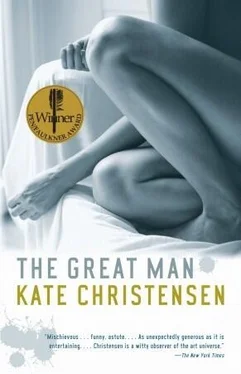He helped her carry things out to the patio, the two plates laden with steaming food, the salad bowl, another bottle of cold Sancerre. The evening sunlight in the yard was so intense, it was almost surreal. It was an odd little garden, a jumble of flowering bushes and wild grasses crowded together in a lush tangle that seemed to grow as it liked, without human interference, yet there seemed to be an original organizing principle behind the riot, God’s or Teddy’s or someone else’s.
Henry sat at the old enameled metal table on Teddy’s tiny bluestone terrace and picked up his fork. “This looks”—he cleared his throat—“delicious, but now I can’t say it.”
Their eyes met.
“A pernicious word,” she said with smug satisfaction.
“Only because you made it into one. It was a fine word before I got here.”
“I only pointed out what ought to be clear to everyone.”
“A habit of yours.”
“Henry,” she said, pouring the wine, “eat your supper.”
He augmented his plate with things from the bowls Teddy had already set out: toasted sliced almonds, homemade apricot chutney, fried banana-pepper rings, minced raw red onion, matchstick-size pieces of fresh jicama, wedges of lime.
The food, which looked bland and unprepossessing, was subtle and amazing. The couscous tasted nutty and buttery. The rich chicken stew was laced with hints of saffron, cinnamon, cayenne, lemon zest, and something else, unfamiliar and exotic, but these things announced themselves very faintly, so he had to concentrate to taste them through the perfectly cooked meat and grain.
“Teddy, this food is brilliant.”
“Why, thank you,” said Teddy. She let the nickname pass this time. Her mood had changed entirely; now she felt mellow, almost flirtatious. This was due in part to the wine; Sancerre was in a class by itself; it could hardly be called by the same name as Chardonnay or Chablis. It had some other dimension other whites lacked.
“You accept the word brilliant but not the word delicious ?”
“You parse it out, Henry. You’re a bright specimen. But while you do, I must be permitted to boast about the provenance of my chicken. It’s the very best chicken money can buy, the sort of bird who ran free and ate food of a higher quality than that of most of the people in the world. But I didn’t have to pay for it…. I bartered for it with flowers from this very garden. I’m single-handedly bringing the art of village subsistence living into an urban setting.”
Henry nodded, swallowing, clearly not fully listening. “How do you feel about the fact that Oscar left everything to Abigail? You don’t even own a single one of his paintings.”
“He never promised me a thing. He loved me for my self-sufficiency, and as you see, it was no act on my part. I am quite poor, monetarily, but I get by very well on my wits and charm.” She laughed. “You can write that down; it’s a tailor-made quote for your book, but you won’t be able to convey the irony with which I said it, will you? I know people in this neighborhood; I have lived around here for decades. Not in this house, of course.”
“Of course,” he said. “After Oscar died, you sold the Calyer Street house to a young couple with three children. I went there. They let me go in and look around, but of course they’ve completely renovated it.”
“Don’t tell me,” she said, closing her eyes. “I don’t even walk on that street anymore if I can help it.”
“He could have left you a painting or two,” Henry prompted.
“Oscar owed her,” said Teddy. “It was as simple as that.”
“I wonder,” said Henry. “I wonder if it’s really that simple in your heart of hearts. But I can’t really ask you that….”
“Listen, Henry,” she said. “Oscar was my beloved mate. I never had any other or wanted one. But after forty-odd years, the word beloved takes on some fairly perverse complexities. You’re probably too young still to know. To be truly loved is to be…known, of course, which also implies despised and even hated. I’m trusting you to see the love in everything I’m saying, including the deli-man comparison. I let you into my house, fed you, gave you a nap, and told you the truth. I have no idea whether or not this was a colossal mistake. But I can’t do otherwise. You have a lot of power.”
“It isn’t a mistake to tell me these things,” Henry assured her. He took some salad and forked a slippery dressing-coated burgundy lettuce leaf into his mouth. Fresh lemon juice, coarse black pepper, and olive oil mingled on his tongue. He stared at the salad on his plate.
“I grow it myself,” said Teddy, who had been watching him closely. “Not directly in Greenpoint soil, don’t worry; that’s so contaminated, it would make you grow another head. Look, over there in tubs by that corner near the fence, an unusual and rare lettuce most people haven’t heard of: Les Oreilles du Diable, ears of the devil. It’s excellent, isn’t it? Nutty and robust. I bought the seeds for the name. I always splurge on interesting-sounding seeds. Thank God I’m healthy…. Most people my age spend everything on medications; I buy good wine and rare seeds. Something symbolic there…maybe out of Greek mythology, seeds and wine…” She took a dreamy sip of wine, a bite of lettuce. Alcohol softened her. It blurred her edges, smoothed her face.
Henry watched her without self-consciousness, half-drunk himself.
They finished their salads, drank more wine. With warm peach crumble and vanilla ice cream, Teddy served espresso and little thimbles of poire liqueur. The sky darkened; the sounds of children in the streets tapered off as they were all called inside. Henry leaned back a little tipsily in his chair. They had talked about a lot of things, but he’d written very little in his notebook.
“Okay,” he said. “Tell me.”
“Tell you what?”
“What I’m doing wrong. With my wife. Tell me how to get her to…”
She didn’t laugh; she understood immediately what he was getting at. “Have an affair,” she replied gently. “A passionate affair. It doesn’t even have to be literally sexual. An affair of the heart, it could be. Daydream about someone else obsessively.”
He didn’t laugh. “That’s how to make my wife want me again? Sleep with someone else?”
“Or just think about sleeping with her. But really think about it.”
“I should get going,” he said.
“You really should,” she told him. “It’s getting late; your wife will be annoyed. Even if she takes care of the baby, she still wants you home.”
“I help,” he said.
“Where did you park?”
“Right out front.”
“Well, you’re not driving home to — where do you live, Westchester or Connecticut?”
“Astoria,” he said. “In a tacky little frame house with aluminum siding.”
“Sounds just like mine,” she said. “Well, you’re not driving home tonight. I’ll call you a cab.”
“I can drive after a few glasses of wine.”
At the door, she handed him a container. “The leftovers,” she said. “For your wife. So she won’t be upset that you’re so late. Or less upset, anyway.”
He took the package from her and went into the night. Teddy stepped out onto her front stoop and watched him get into his car, which was indeed a Volvo, but an old one. She waved as he drove off, watched his taillights disappear.
Teddy and her friend Lila had a standing breakfast date: every Saturday morning at eight. Today they were at Lila’s. On the way over, Teddy had stopped at the little Mexican market that lay between their houses and bought four of the fresh buns they always had on the counter in a plastic box, not too sweet, not too soft, four for a dollar. Lila had heated them up and served them with blackberry jam, butter, Jarlsberg, fruit salad, and coffee. They were sitting on Lila’s shaded back deck, looking at her yard. A large-leafed vine sprawled on a trellis, heavy with the kind of perfectly shaped, cascading bunches of purple grapes Teddy had always associated with the Calvinist Dutch masters: symbols of bacchanalian wantonness and drunkenness. Lilac bushes, tea roses, rhododendrons, and hydrangeas, in splotches of purples, reds, pinks, and oranges, grew against the back brick wall. On the cartoonishly green lawn, under a little pergola, were a white wrought-iron table and matching chairs. Two docile little pear trees rose near the house, thoughtfully blossoming in the spring and bearing fruit in the fall. An equally thoughtful pine tree provided shade in one corner of the yard, under which Lila had had built a playhouse for visiting grandchildren.
Читать дальше












